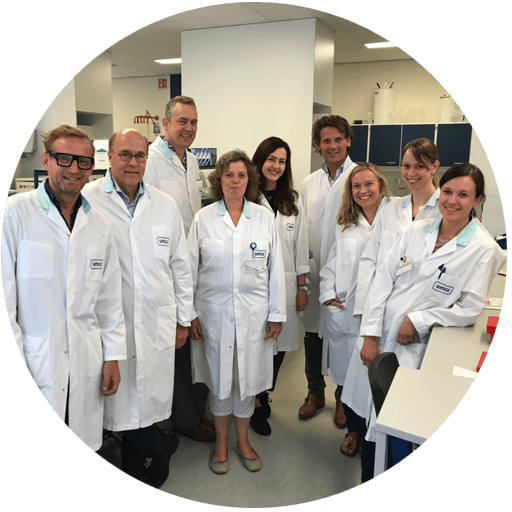Lymph&Co Research Grant
Lymph&Co Research Grant
Lymph&Co Call for proposals
The Lymph&Co Foundation supports groundbreaking scientific research that may lead the way to the cure or the improved therapeutic management of lymphoma.
1. Aim of the call
Every year about 500,000 new patients are diagnosed with malignant lymphoma worldwide. While an increasing proportion of patients can currently be cured with various modern modalities of treatment due to scientific progress, unfortunately there is still a significant proportion of patients in whom cure cannot be attained. Thus, the treatment of malignant lymphoma poses a huge unmet therapeutic need.
Lymph&Co’s motto is “Away with Lymphoma”.
The Lymph&Co Foundation supports outstanding researchers around the world who are looking for ways to better understand and treat these diseases. The Lymph&Co Research Grant is one of our instruments to support innovative research of unquestionable scientific quality with a potentially high impact for patients.
2. Call Topic
The aim of this call is to fund groundbraking translational research on malignant lymphoma, malignant lymphoid neoplasia and related malignant blood diseases (particularly lymphoid disorders). Projects will be considered eligible that enhance our understanding and furnish insights or develop tools that will advance the treatment.
3. Application
3.1 Eligibility
Any research project meeting the criteria of sections #1 (Aim of the call) and #2 (Call topic) is eligible for funding.
Applications from individual researchers or research groups are welcome. Investigators (national or international) involved in translational research on lymphoma are invited to submit a research proposal. In particular, collaborative research proposals from various scientific groups (national and/or international) with complementing expertise are encouraged to apply for a research grant.
The main applicant must be employed by a university, university hospital or research organization.
Commercial parties are not eligible for funding.
3.2 Submission of proposal (use Lymph&Co application form)
Applications should be submitted using the application form available on the Lymph&Co website.
There will be a two-stage submission procedure for applications: pre-proposals and full proposals. The call is scheduled to open on 3 Februari 2025. The deadline for submitting the pre-proposals is on 27 March 2025. The Scientific Advisory Board of Lymph&Co will carry out a scientific evaluation according to specific evaluation criteria. Based on this central evaluation, selected consortia will be invited to submit a full proposal (submission deadline 7 August 2025).
Applications must be sent to the secretariat of the Scientific Advisory Board of Lymph&Co by email (research@lymph-co.com) after filling in the submission form.
Timeline
3 February 2025
Publication of the Lymph & Co Call for proposals
27 March 2025
Submission deadline for pre-proposals to research@lymph-co.com
6 June 2025 at the latest
Full proposal invitations sent to project coordinators
7 August 2025
Submission deadline for full proposals
Beginning of Dec 2025 at the latest
Final funding decision to applicants
3.3 Grant conditions and budget
Applications for funding for personnel and materials/infrastructure have a maximum of 1.0 M€. Funding is granted for a maximum of four years.
Applicants are only allowed as main applicant or co-applicant on one research proposal.
By submitting a research proposal, applicants agree to comply with the grant conditions imposed on acceptance of a grant. These conditions pertain to the open access policy, code of conduct, and ethical approval by relevant authorities. Applicants should also be willing to present their research project to donors of Lymph&Co and/or other interested parties. A full description of conditions can be downloaded here.
3.4 Contact details
The only official communication line of the proposal is between the Lymph&Co Secretariat (research@lymph-co.com) and the project coordinator. The project coordinator will be the person contacted by the Secretariat during the application procedure, so he/she must forward this information to the other participants.
3.5 Downloads
Download the Call for proposals, application form and Terms & Conditions Here:
4. Evaluation
Proposals will be assessed according to specific evaluation criteria (see below).
The Scientific Advisory Board assesses submitted preproposals based on the evaluation criteria below to select most promising ideas which best fit the subject of the call text. At this stage, no (inter-)national reviews will be sought. Based on the assessments, a small number of preproposals will be selected for submission of a full proposal.
Full proposals will be send to at least three (inter-)national reviewers. The Scientific Advisory Board assesses the full proposals based on the reviewers’ reports and the evaluation criteria below. After careful consideration, the Scientific Advisory Board issues recommandations about funding of proposals to the Board of Lymph&Co. The Board decides which proposals(s) will be funded.
Evaluation criteria:
1. Excellence
- Clarity and pertinence of the objectives;
- Soundness of the concept;
- Innovative potential;
- Feasibility of the project (adequate requested resources, time schedule, access to patients or patients’ data and/or material)
- Competence and experience of participating research partners in the field(s) ofthe proposal (previous work in the field, specific technical expertise).
2. Impact
- Potential of the expected results for the future clinical applications including patients’ needs;
- Effctiveness of the proposed measures to exploit and disseminate the project results (including managementof IPR), to communicate the project to the patients and to manage research data where relevant;
- Industry and Patient Organization participation/engagement (when appropriate/applicable);
- Competence and experience of participating research partners in the field(s) of the proposal (previous work in the field, specific technical expertise).
3. Quality and efficiency of the implementation
- Coherence and effectiveness of the work plan, including appropriateness of the allocation of tasks, resources and time frame;
- Budget and cost-effectiveness of the project (rational distribution of resources in relation to project’s activities, partners responsibilities and time frame).




